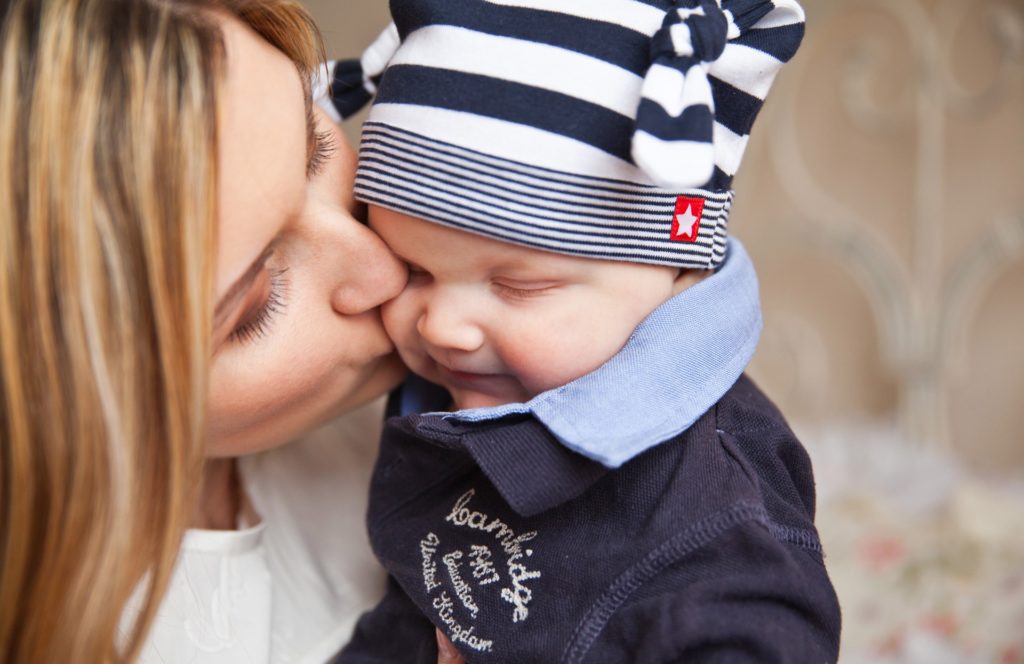- Calls to this hotline are currently being directed to Within Health, Fay or Eating Disorder Solutions
- Representatives are standing by 24/7 to help answer your questions
- All calls are confidential and HIPAA compliant
- There is no obligation or cost to call
- Eating Disorder Hope does not receive any commissions or fees dependent upon which provider you select
- Additional treatment providers are located on our directory or samhsa.gov
How Postpartum Depression Can Increase the Risk of an Eating Disorder

Contributor: Melissa O’Neill, LCSW, Director of Program Development at Timberline Knolls Residential Treatment Center
In a recent interview for the cover of Glamour’s April 2017 issue, mega-model Chrissy Teigen opened up about her struggles with postpartum depression (PPD), bringing to light a painful condition that many new mothers often struggle with in silence.
This 31-year-old mother of a new baby girl is but one of countless women who will battle with postpartum depression following the birth of their babies. According to the Postpartum Support International organization, one in seven mothers will be diagnosed with PPD, a serious mental health condition that can result in significant symptoms of depression and anxiety [1].
Understanding Postpartum Depression
Some of the symptoms related to PPD and anxiety include but are not limited to:
- Feeling irritable or angry with those around you
- Having difficulty bonding with your baby
- Experiencing feelings of anxiousness or panic
- Feeling depressed and sad
- Having difficulty eating and/or sleeping
- Ideations or intentions of hurting yourself or your baby
Sadly, many new mothers may interpret these signs/symptoms as failure on their part to be a good mother, but PPD is a real mental illness for which there are effective and helpful treatments.
For new mothers who also have struggled with an eating disorder or have a history of disordered eating, the experience of PPD can be a stressor that triggers a re-emerging eating disorder. Even if an eating disorder has been in remission for years, PPD can make a woman more susceptible to developing abnormal and compensatory behaviors with food and body once again.
Connection Between Postpartum Depression and Eating Disorders
 What is the connection between PPD and eating disorders? Researchers from the University of North Carolina’s Eating Disorder Program found that in various studies of women who were treated for anxiety approximately thirty five percent had previously suffered from an eating disorder [2].
What is the connection between PPD and eating disorders? Researchers from the University of North Carolina’s Eating Disorder Program found that in various studies of women who were treated for anxiety approximately thirty five percent had previously suffered from an eating disorder [2].
Having an eating disorder may been seen as a risk factor during pregnancy, and the pregnancy and postpartum period can be an incredibly vulnerable time for women, especially those with a history of previous psychiatric issues. Some of the changes that mothers are facing include biological, emotional, and environmental challenges, all which can be potentially triggering to a mother susceptible to mental illness.
For example, a new mother faces rapid changes in body shape, hormone levels, and weight, as well as an overall lifestyle change after giving birth and bringing a new baby into the world. The combination of these many stressors can be difficult to cope with, triggering some new moms to fall back on eating disorder behaviors that create an artificial sense of control.
Effective Treatment and Intervention
PPD that goes undiagnosed and untreated can lead to severe consequences, not only for the mother, but for the entire family. Children of mothers with active eating disorders may be at increased risk for also developing an eating disorder; therefore, establishing adequate treatment for mothers with mental health issues is an important step for effective interventions [2,3].
Routine screenings during pregnancy and postpartum can provide a helpful window of opportunity for physicians/midwives to assess for a history of mental illness. Professionals that identify an eating disorder can encourage treatment approaches early on in the pregnancy that may help break a recurring cycle.
 Pregnancy is often an ideal time to intervene with treatment that will help improve the prognosis for both the mother and baby, as women are generally motivated to make necessary changes that will support healthy outcomes for their babies.
Pregnancy is often an ideal time to intervene with treatment that will help improve the prognosis for both the mother and baby, as women are generally motivated to make necessary changes that will support healthy outcomes for their babies.
Integrating mental health care as a routine part of prenatal health screens can also help physicians identify pregnancy-related depression and/or the risk of PPD. If a pregnant woman with a history of an eating disorder can identify her higher risk of experiencing PPD, certain protocols can be established ahead of time to better support her after childbirth, such as enlisting the help of a therapist or working with a support group.
If you are a woman with a history of an eating disorder and are currently pregnant, talk with your doctor and/or treatment team about possible proactive steps you can take to ensure you and your baby are supported during the postpartum phase of your motherhood journey.
About the Author: Melissa O’Neill, LCSW, is the Director of Program Development for Timberline Knolls Residential Treatment Center. Melissa’s role involves collaborating with others to create the vision and curriculum for all group programming offered at TK. She also clinically supervises the talented specialists who facilitate groups all over campus.
Early in her career, Melissa spent time in residential care, working with children with significant trauma histories. She then ran a substance abuse IOP followed by several years in private practice. She also managed an IOP/PHP program for Eating Disorders and Mood Disorders. At Timberline she started as a Primary Therapist, followed by serving as a clinical lead.
Melissa received her Bachelor of Arts degree in Psychology from Vanderbilt University. She earned her Master’s degree in Social Work from the University of Illinois.
Melissa is a member of the International Association of Eating Disorder Professionals.
References:
[1]: Postpartum Support International, “Pregnancy and Postpartum Mental Health”, http://www.postpartum.net/learn-more/pregnancy-postpartum-mental-health/[2]: “Pregnancy-related depression linked to eating disorders and abuse histories”. http://www.med.unc.edu/www/newsarchive/2011/june/pregnancy-related-depression-linked-to-eating-disorders-and-abuse-histories Accessed 09 March 2017
[3]: Koubaa S, et al. Pregnancy and neonatal outcomes in women with eating disorders. Obstet Gynecol. 2005 Feb; 105(2): 255-60.
The opinions and views of our guest contributors are shared to provide a broad perspective of eating disorders. These are not necessarily the views of Eating Disorder Hope, but an effort to offer discussion of various issues by different concerned individuals.
We at Eating Disorder Hope understand that eating disorders result from a combination of environmental and genetic factors. If you or a loved one are suffering from an eating disorder, please know that there is hope for you, and seek immediate professional help.
Reviewed By: Jacquelyn Ekern, MS, LPC on March 31, 2017.
Published on EatingDisorderHope.com

The EatingDisorderHope.com editorial team comprises experienced writers, editors, and medical reviewers specializing in eating disorders, treatment, and mental and behavioral health.

